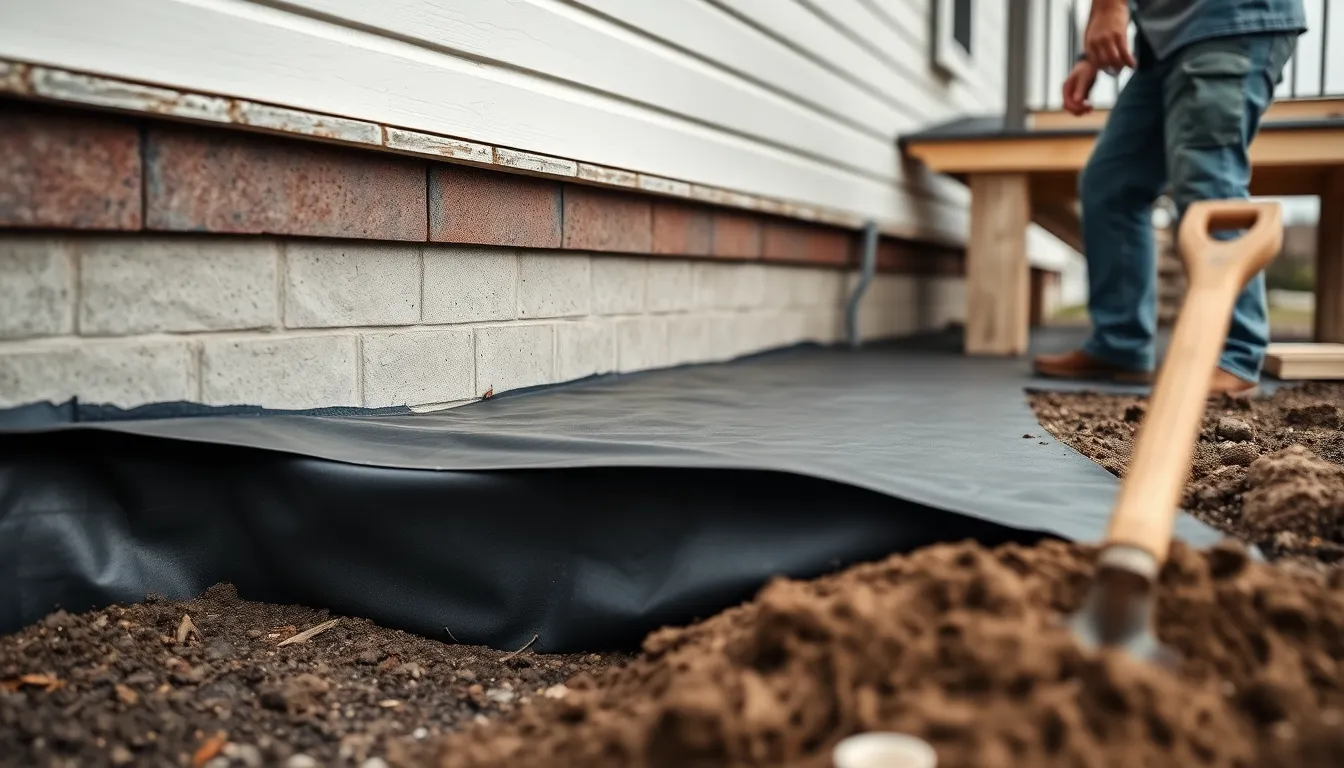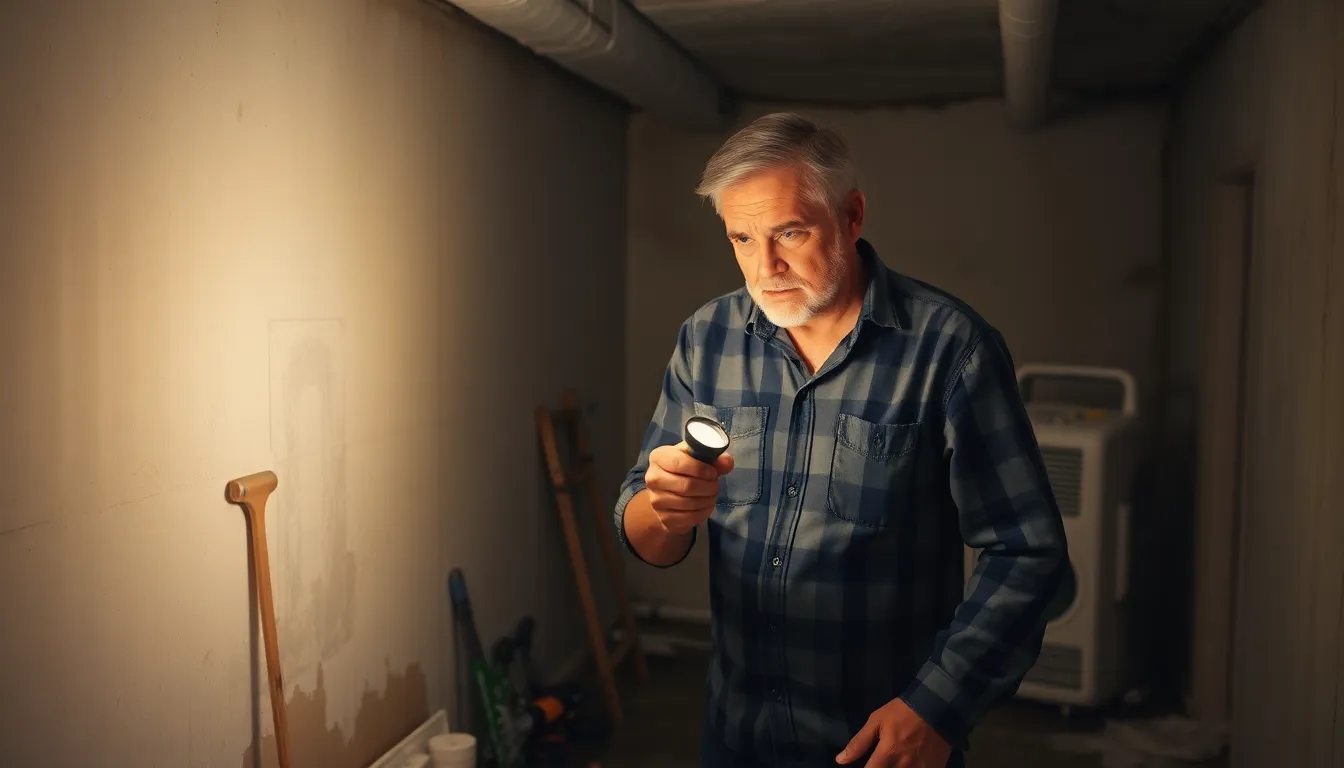Imagine stepping into your basement and finding a cozy, dry haven instead of a swampy disaster zone. Basement waterproofing isn’t just a fancy term; it’s the superhero your home desperately needs. Water damage can turn your dream space into a moldy nightmare faster than you can say “soggy socks.”
With the right waterproofing solutions, homeowners can protect their valuable investments and avoid the dreaded musty smell that lingers like an unwelcome guest. From simple DIY tricks to professional interventions, there’s a method for every basement. So why let water crash the party when you can keep it at bay? Let’s dive into the world of basement waterproofing and discover how to keep your home dry, safe, and free from the aquatic intruders.
Table of Contents
ToggleOverview of Basement Waterproofing
Basement waterproofing serves as a critical function for homeowners, helping to safeguard against water damage. Protecting a basement prevents conditions that lead to mold growth and unwanted odors.
Importance of Waterproofing
Waterproofing a basement reduces the risk of structural damage. It protects personal belongings, keeps energy costs down, and enhances indoor air quality. Additionally, a dry basement increases a home’s value, making it more appealing to potential buyers. Regular maintenance and waterproofing systems can ensure lasting protection against future water intrusion.
Common Problems Caused by Moisture
Moisture in a basement leads to several severe issues. Mold and mildew can thrive in damp conditions, posing health hazards to occupants. Water can weaken foundations over time, resulting in costly repairs. Musty odors often accompany excess humidity, creating an unpleasant living environment. Pest infestations, such as termites and rodents, frequently occur in areas with moisture, exacerbating structural vulnerabilities.
Types of Basement Waterproofing Methods

Various basement waterproofing methods exist to combat water intrusion effectively. Homeowners often choose between interior and exterior solutions based on their specific needs.
Interior Waterproofing Solutions
Interior waterproofing solutions aim to manage water that enters from within the basement. Applying sealants to walls and floors significantly reduces moisture penetration. Installing interior drainage systems, such as sump pumps, efficiently directs water away from the basement. Adding dehumidifiers improves air quality and lowers humidity levels. Moreover, utilizing drainage channels redirects water toward drainage points. Each of these methods can protect against mold growth and structural damage while maintaining a dry and safe environment.
Exterior Waterproofing Solutions
Exterior waterproofing solutions prevent water from entering the basement before it reaches the walls. Excavating around the foundation allows for waterproof membranes to be applied directly. Installing a footing drain system helps to channel water away from the foundation. Grading the yard away from the home reduces water accumulation near the basement. Adding downspout extensions directs rainwater further from the foundation. These preventative measures can enhance the longevity of the basement structure and mitigate potential water-related issues effectively.
Benefits of Basement Waterproofing
Basement waterproofing offers numerous advantages for homeowners, ensuring safety, health, and long-term property value.
Increased Property Value
Investing in basement waterproofing significantly enhances property value. A dry and secure basement appeals to buyers, making homes more attractive in real estate markets. Evidence shows that homes with waterproofed basements often sell for 10% to 25% more than those without. Buyers tend to prioritize properties with reduced risks of mold damage and structural issues. Moreover, waterproofing aids in meeting local building codes, boosting compliance and desirability. In addition, a well-maintained basement can transform into habitable space, further depreciating appeal.
Health Benefits
Maintaining a waterproof basement contributes to improved indoor air quality. Moisture build-up fosters mold and mildew growth, which can cause respiratory issues and other health problems. Waterproofing minimizes humidity levels, leading to a more comfortable living environment. It also reduces allergens, promoting overall wellness. Controlling dampness discourages pests like termites and rodents, which are attracted to moist conditions. Ensuring a safe basement environment benefits the entire household, making it crucial for health-conscious homeowners.
Factors to Consider When Choosing a Waterproofing Method
Selecting the right waterproofing method relies on several key factors. Understanding these factors helps homeowners make informed decisions to protect their basements effectively.
Cost Considerations
Cost significantly influences the waterproofing method chosen. Homeowners should compare initial installation costs with long-term savings. DIY options may seem cheaper upfront, but professional methods can prevent future repairs that add to expenses. Waterproofing systems may range from $1,000 to $5,000 depending on the chosen solution. Budgeting for additional maintenance costs is essential. Additionally, considering the potential increase in property value—up to 25% for waterproofed basements—provides justification for investing in quality methods. Evaluating warranties and the lifespan of waterproof barriers also helps assess the overall cost-effectiveness.
Environmental Factors
Environmental conditions impact the selection of waterproofing methods. Climate plays a role, especially in areas prone to heavy rainfall or snow. In such regions, exterior methods like drainage systems and membranes effectively divert water. Drainage channels can reduce pressure on foundations, preventing leaks or seepage. Soil type also matters; clay soils retain moisture more than sandy ones, necessitating more robust waterproofing solutions. Homeowners should evaluate local weather patterns and groundwater levels to determine the best approach. An understanding of these factors allows for tailored solutions that provide optimal protection against water damage.
Investing in basement waterproofing is a crucial step for homeowners looking to safeguard their property. By addressing moisture issues proactively, they can prevent costly repairs and health hazards associated with mold and structural damage. A well-waterproofed basement not only enhances the home’s value but also contributes to a healthier living environment.
Homeowners should carefully evaluate their options and consider factors like cost and environmental conditions when choosing a waterproofing method. Whether opting for DIY solutions or professional services, the benefits of maintaining a dry basement far outweigh the initial investment. Ultimately, a dry basement leads to peace of mind and a more comfortable home.



